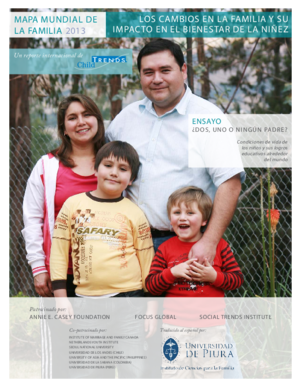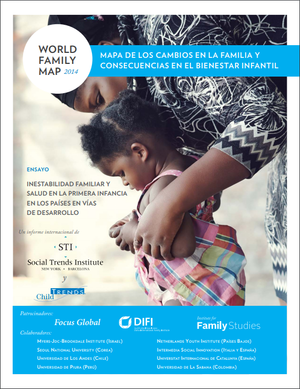Mapa Mundial de La Familia
El World Family Map Project (WFMP) es un consorcio internacional que agrupa a diversas instituciones como fundaciones, organizaciones no gubernamentales y universidades. El objetivo del WFMP es estudiar el estado de la familia nivel mundial y descubrir las tendencias familiares, teniendo en cuenta los drásticos cambios que están afectando la vida familiar.
Cada año se publica un nuevo reporte con énfasis en un tema en particular que responda a los interrogantes que surgen alrededor de la institución familiar.
Instituto Latinoamericano de la Familia, ILFARUS de la Universidad de La Sabana participa como co-patrocinadora del reporte
Reporte Mapa Mundial de la Familia - 2019
Este informe responde a esta pregunta tomando como base la relación entre la religión y cuatro importantes factores –la calidad de la relación, la fecundidad, la violencia doméstica y la infidelidad– en once países de América, Europa y Oceanía.
Reporte Mapa Mundial de la Familia - 2017
Reporte Internacional Mapa Mundial de la Familia . Los cambios en la familia y consecuencias en el bienestar infantil. Estudio elaborado por el Child Trends Institute (USA) y el Institute for Family Studies con la colaboración del Instituto de La Familia de la Universidad de La Sabana, entre otras reconocidas universidades del mundo como el Myers-JDC-Brookdale Institute (Israel), Netherlands Youth Institute (Países bajos), Seoul National University Intermedia Social Innovation (Italia), Universidad de Los Andes (Chile), Universitat Internacional de Catalunya (España), Universidad de Piura (Perú).
Reporte Mapa Mundial de la Familia - 2015
Reporte Internacional Mapa Mundial de la Familia . Los cambios en la familia y consecuencias en el bienestar infantil. Estudio elaborado por el Child Trends Institute (USA) y el Institute for Family Studies con la colaboración del Instituto de La Familia de la Universidad de La Sabana, entre otras reconocidas universidades del mundo como el Myers-JDC-Brookdale Institute (Israel), Netherlands Youth Institute (Países bajos), Seoul National University Intermedia Social Innovation (Italia), Universidad de Los Andes (Chile), Universitat Internacional de Catalunya (España), Universidad de Piura (Perú).
Reporte Mapa Mundial de la Familia - 2014
Reporte Internacional Mapa Mundial de la Familia 2014. Los cambios en la familia y consecuencias en el bienestar infantil. Estudio elaborado por Social Trends Institute y Child Trends con la colaboración del Instituto de La Familia de la Universidad de La Sabana, entre otras reconocidas universidades del mundo como el Myers-JDC-Brookdale Institute (Israel), Netherlands Youth Institute (Países bajos), Seoul National University Intermedia Social Innovation (Italia), Universidad de Los Andes (Chile), Universitat Internacional de Catalunya (España), Universidad de Piura (Perú).

Reporte Mapa Mundial de la Familia - 2013
Reporte Internacional Mapa Mundial de la Familia 2013. Los cambios en la familia y su impacto en el bienestar de la niñez. Estudio elaborado por el Child Trends Institute (USA) con la colaboración del Instituto de La Familia de la Universidad de La Sabana, entre otras reconocidas universidades del mundo como la Universidad de Piura (Perú), Institute of Marriage and Family (Canadá), Universidad de Los Andes (Chile), University of Asia and Pacific (Filipinas), Seoul National University.
Artículos en revistas indexadas resultado del Mapa Mundial de La Familia
Autores: Laurie F. DeRose, Gloria Huarcaya, Andrés Salazar-Arango
Año: 2018
Publicado en: Journal of Family Issues
Resumen: Recent work on gender differences in academic performance in wealthy countries highlights the importance of family structure: Boys’ education suffers more than girls’ education does when biological fathers are absent. We explored whether high rates of father absence in Latin America and the Caribbean might help explain why girls in the region have been more likely than boys to complete secondary school for decades. Data from the Demographic and Health Surveys instead demonstrated that the effect of father absence did not differ between boys and girls. The reverse gender gap in Latin American education cannot be explained by father absence compromising boys’ on-time progression at ages 9 to 14 more than girls’. In the United States and other high-income countries, boys are particularly disadvantaged by father absence in poorer households, but in Latin America and the Caribbean poorer households may have higher levels of promale bias that offset any similar pattern.
Palabras clave: education, family demography, gender and family, household living arrangements, quantitative, single parents
Autores: Laurie F. DeRose, Andrés Salazar-Arango, Paúl Corcuera García, Montserrat Gas-Aixendri y Reynaldo Rivera
Año: 2017
Publicado en: Population Studies
Resumen: Efforts to improve child survival in lower-income countries typically focus on fundamental factors such as economic resources and infrastructure provision, even though research from post-industrial countries confirms that family instability has important health consequences. We tested the association between maternal union instability and children's mortality risk in Africa, Latin America and the Caribbean, and Asia using children's actual experience of mortality (discrete-time probit hazard models) as well as their experience of untreated morbidity (probit regression). Children of divorced/separated mothers experience compromised survival chances, but children of mothers who have never been in a union generally do not. Among children of partnered women, those whose mothers have experienced prior union transitions have a higher mortality risk. Targeting children of mothers who have experienced union instability-regardless of current union status-may augment ongoing efforts to reduce childhood mortality, especially in Africa and Latin America where union transitions are common.
Palabras clave: Africa; Asia; Latin America and the Caribbean; childhood mortality; divorce; morbidity; single motherhood; union instability; union transitions
Autores: Laurie F. DeRose, Gloria Huarcaya, Andrés Salazar-Arango, Marcos Agurto, Paúl Corcuera, Marga Gonzalvo-Cirac, Claudia Tarud
Año: 2016
Publicado en: Journal of Family and Economic Issues
Resumen: We used data from Demographic and Health Surveys and the Mexican Family Life Survey to test how children’s living arrangements were related to their progress through school in countries comprising three-quarters of the population in Latin America and the Caribbean. Our results indicated that family instability presents a challenge for educational progress: Large proportions (23–60 %) lived apart from at least one biological parent, and children in stepfamilies did not show better educational progress than children living with single parents. In some countries, living with other men was associated with worse educational outcomes, and the occasional advantage associated with living with other women was modest. Other adults in the household did not appear to buffer negative effects associated with parental absence.
Palabras clave: family instability, Education, Latin America and the Caribbean, Stepfamilies, Single motherhood, Children’s living arrangements, Father absence


